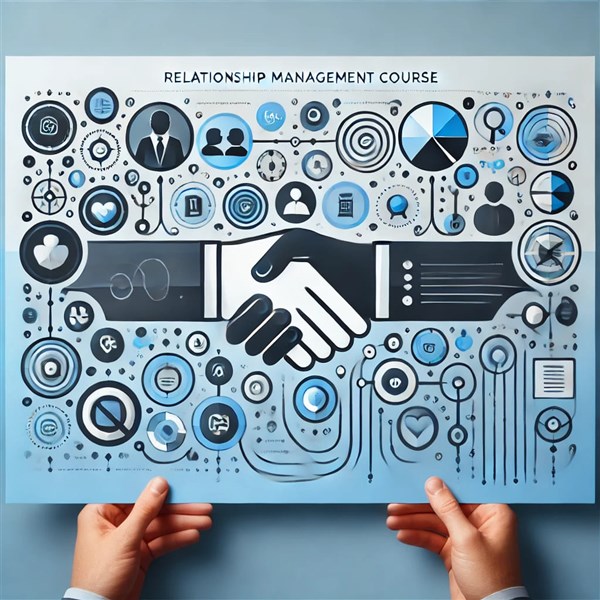
In today’s world, where professional and personal success often depends on strong relationships, relationship management skills have become crucial. These skills empower individuals to handle interactions effectively, resolve conflicts, and build trust with others. Whether you're a customer service representative, manager, or sales professional, a relationship management course can provide tools and techniques to help you succeed in various roles and settings.
In this article, we’ll explore the key skills you’ll gain in a relationship management course, including communication, conflict resolution, negotiation, empathy, active listening, and more. By mastering these competencies, you can set yourself apart in your career and create meaningful professional relationships.
Skills You'll Learn in a Relationship Management Course
1. Communication Skills
Why Communication Matters
Communication lies at the heart of all relationships. A relationship management course teaches effective communication methods, both verbal and non-verbal, to help you connect with others, express ideas clearly, and listen actively.
Skills You’ll Develop
- Clarity and Precision: Learn how to deliver messages in a straightforward and understandable manner.
- Non-verbal Communication: Understand how body language, tone, and facial expressions impact communication.
- Feedback Techniques: Master the art of giving and receiving feedback constructively, essential for improving interactions.
Communication skills enable you to handle conversations better, reduce misunderstandings, and ensure that your message is clearly received.
2. Conflict Resolution
Importance of Conflict Resolution
Conflict is inevitable in any relationship. How you handle it can either strengthen or damage a relationship. A relationship management course provides frameworks and techniques to address disagreements in a productive way.
Skills You’ll Develop
- Identifying Sources of Conflict: Learn to recognize underlying issues before they escalate.
- Problem-Solving Approaches: Develop methods to approach conflicts calmly and look for mutually beneficial solutions.
- Emotional Control: Training in self-regulation helps you manage emotions and respond thoughtfully rather than react impulsively.
By acquiring conflict resolution skills, you can navigate challenges more effectively, leading to healthier and longer-lasting relationships.
3. Negotiation Skills
The Role of Negotiation in Relationship Management
Negotiation isn't just about business deals; it’s about reaching an agreement that satisfies all parties. These skills are valuable in personal interactions, customer relations, and team collaboration.
Skills You’ll Develop
- Preparation Techniques: Learn how to gather information and prepare for negotiations, including understanding each party's needs and goals.
- Creating Win-Win Situations: Focus on achieving solutions that are beneficial for all involved.
- Persuasion Tactics: Understand how to influence others respectfully and effectively without overpowering them.
With strong negotiation skills, you can advocate for your interests while maintaining positive relationships, a vital skill in sales, management, and customer service.
4. Empathy
Why Empathy Matters in Relationship Management
Empathy allows you to understand others’ feelings and perspectives, which is critical for building trust and rapport. A relationship management course emphasizes the development of empathy, helping you connect with others on a deeper level.
Skills You’ll Develop
- Perspective-Taking: Gain insights into seeing situations from others' viewpoints.
- Emotional Intelligence: Learn to read emotions and respond with understanding.
- Building Trust: Develop skills to foster openness and trust, creating stronger connections with colleagues, clients, or customers.
Empathy not only strengthens interpersonal relationships but also improves team dynamics, fostering a more collaborative work environment.
5. Active Listening
The Power of Active Listening
Active listening goes beyond hearing words; it involves understanding the speaker's message and responding thoughtfully. This skill helps reduce misunderstandings and shows others that their thoughts and opinions are valued.
Skills You’ll Develop
- Focused Attention: Practice techniques to stay present and attentive during conversations.
- Reflective Listening: Learn to paraphrase what others say to confirm understanding.
- Responding Thoughtfully: Avoid interrupting and ask clarifying questions to engage meaningfully in discussions.
Active listening fosters respect and helps you respond appropriately, strengthening professional and personal relationships alike.
6. Rapport Building
Importance of Rapport in Relationship Management
Building rapport is essential for creating a foundation of trust and comfort in any relationship. It allows for smoother communication, especially in high-stakes interactions like sales or negotiations.
Skills You’ll Develop
- Finding Common Ground: Learn strategies to identify shared interests and experiences.
- Adaptability: Adjust your communication style to align with the other person’s preferences.
- Personalized Interactions: Understand how small gestures and tailored responses can enhance connections.
Rapport building is particularly valuable in roles where establishing a quick, genuine connection is essential, such as client management, consulting, or leadership.
7. Boundary Setting
Why Boundaries Are Key
Healthy relationships depend on clear boundaries. A relationship management course provides insights on setting appropriate limits to protect your well-being and maintain respect in interactions.
Skills You’ll Develop
- Assertiveness: Learn to assert your needs without being aggressive or passive.
- Respecting Others’ Boundaries: Understand the importance of recognizing and honoring others’ limits.
- Conflict Prevention: Setting boundaries can help reduce misunderstandings and conflicts before they arise.
With clear boundaries, you can create a balanced work environment and maintain healthy relationships.
8. Stakeholder Management
The Role of Stakeholder Management in Business
In business, managing relationships with various stakeholders—clients, team members, and vendors—is crucial. This skill is especially important in leadership, project management, and customer-facing roles.
Skills You’ll Develop
- Prioritization: Learn to identify and prioritize key stakeholders based on their influence and needs.
- Communication Plans: Develop strategies for regular, transparent communication with stakeholders.
- Balancing Expectations: Learn techniques for balancing stakeholder needs without compromising other responsibilities.
Effective stakeholder management skills enable you to maintain transparency, meet expectations, and cultivate strong business relationships.
9. Decision-Making Skills
Why Decision-Making Is Critical in Relationship Management
Good decisions can strengthen relationships, while poor ones can erode trust. Decision-making is integral to relationship management, where choices can impact individuals, teams, and clients.
Skills You’ll Develop
- Weighing Options: Learn techniques to assess options and consequences.
- Consideration of Others’ Views: Practice factoring in others’ perspectives to make inclusive decisions.
- Risk Management: Gain insights on how to evaluate risks and make decisions under pressure.
By improving decision-making skills, you can make choices that foster trust and respect among team members and clients.
Conclusion
A relationship management course equips you with essential skills that are applicable across a wide range of professions. By mastering communication, conflict resolution, negotiation, empathy, and other key skills, you can navigate workplace interactions more effectively, build stronger professional relationships, and ultimately drive career growth.
Whether you are looking to improve your client interactions, enhance team collaboration, or boost your leadership abilities, relationship management training offers a pathway to becoming a more effective and respected professional.
Investing in a relationship management course can significantly boost your career. It equips you with the skills to handle professional relationships effectively, leading to better collaborations and business growth. Koenig Solutions offers comprehensive relationship management training that can help you achieve your career goals.







COMMENT